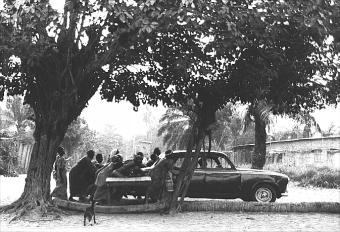|
|

|
Divine carcasse
Himmlisches Wrack Divine Body Dominique Loreau Belgien/Bénin 1998 Produktion/production company: Underworld, Carré Noir (RTBF Liège), Centre de L'audiovisuel/Bruxelles, Office de Radio et Télévision Benin, Sindibad Films. Weltvertrieb/world sales: CBA Centre de l'Audiovisuel 18 rue Joseph II, B-1000 Bruxelles Tel.: (32-2) 2184080, Fax: 2179197 Kamera/cinematography: Etienne de Grammont Ton/sound: Jean-Jacques Quinet Schnitt/editor: André Delvaux Musik/music: Philippe Woitchik Darsteller/principal cast: Alphonse Atacolodjou, Szymon Zaleski, Fidèle Gbegnon, Simonet Biokou Format: 35mm, Farbe/colour Länge/running time: 88 Minuten/minutes |
Kino 7 im Zoo-Palast Do 12.2. 13.30 OmU Delphi-Filmpalast Do 12.2. 21.30 OmU Arsenal Fr 13.2. 12.30 OmU Akademie der Künste Sa 14.2. 22.15 OmU Babylon im Zeughauskino So 15.2. 17.00 OmU | |
|
Die Geschichte eines alten Peugeot, der von seinem weißen Besitzer, einem Entwicklungshelfer, wie ein Kultgegenstand verehrt wird, dann, vorübergehend entweiht, in den Straßen von Cotonou in Benin als illegales Taxi dient, zum Schluß in seine Einzelteile zerlegt und mit Hilfe des Schweißbrenners wieder kultischen Zwecken zugeführt wird. Dominique Loreau: ''Die Geschichte eines Autos zu filmen, war eine Begegnung mit einer anderen Kultur, einem anderen Verhältnis zur Welt, zu Gegenständen, zum Tod. Es war auch eine Begegnung mit der Welt des Voodoo und des Polytheismus, in dem es heißt, daß die Götter in der Materie, in den Gegenständen, in den toten oder lebenden Lebewesen wohnen. Die Menschen und die Dinge, die Lebenden und die Toten befinden sich im ständigen Übergang, in ständiger Verwandlung. Die überall anwesenden Vorfahren lenken das Leben der Lebenden. In Benin stirbt man niemals richtig… Alle Szenen des Films sind frei erfunden, basieren jedoch auf wahren Begebenheiten. Auch die Schauspieler spielen sich selbst. Das Auto endete wirklich als Skulptur. Für mich war es die einzige Art, Benin ohne Voyeurismus zu filmen und die Schauspieler in den Film zu integrieren. Vielleicht kann die Beschreibung und der Vergleich der beiden Welten, die ansonsten selten zusammenkommen, ein Nachdenken über die Beziehung zwischen Afrika und Europa fördern.'' Dominique Loreau, geb. 1955 in Brüssel. Studium der Geschichte der Philosophie, Ausbildung als Cutterin. Dozentin für Journalismus und Montage. Filme seit 1981 u.a. Zigzag (198..), La folie des autres (1990), Les noms n'habitent nulle part (1994). |
The film follows the fortunes of an old Peugot off-loaded in Cotonou, Benin. As it changes hands, we glimpse into the lives of its successive owners: starting with Simon, living the sheltered life of an overseas development worker; his cook Joseph, who silks the car as an illicit taxi; and the garage mechanics, who try to breathe new life into it every time it breaks down.Then one day the car is left for junk by the roadside. And a smithy and sculptor named Simonet salvages bits and pieces to produce the figure of Agbo - the voodoo god of 'night watchmen' - a task set him by the wise men of the hamlet of Ouassa. Dominique Loreau: ''Filming the story of the car was an encounter with another culture, another relationship to the world, to objects, and to death. An encounter with voodoo and polytheistic thinking, where gods inhabit substances, objects, the living and the dead. Humans and ojects, the living and the dead, are in permanent transition and metamorphosis. The ancestors are omnipresent, guiding the lives of the living. In Benin people never really die… All the invented situations are inspired by real ones, and the actors, who for the most part play themselves, improvise in their own language. The car was really transformed into a sculpture, and adopted by its inhabitants as a divine protector. For me, this was the only way to film Benin without voyeurism, and to involve the actors in the film. And perhaps describing and placing these two worlds into a rare relationship with one another is a comment on the relations between Europe and Africa.'' |

